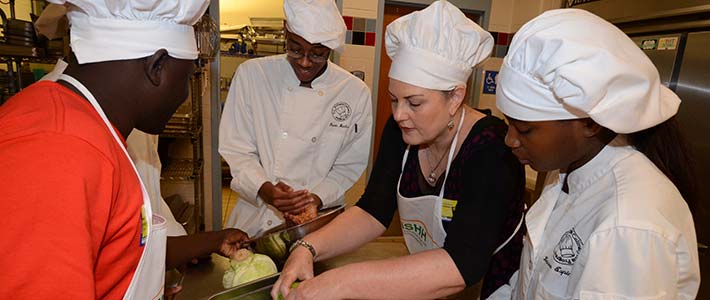Commercial sustainability of nutritious foods is a cornerstone for countries to improve their food security. The American Soybean Association’s World Initiative for Soy in Human Health (WISHH) used technical assistance and trade to build upon that cornerstone in El Salvador and Guatemala where local companies now manufacture nutritious soy-based foods for multiple markets.
The U.S. Department of Agriculture’s (USDA) Market Access Program has funded WISHH’s technical trainings for Central American employees, such as food technologists. USDA’s Foreign Market Development program has allowed Central American companies to send key staff to participate in trade teams to the United States where they learned more about U.S. soybeans and the soybean products the company is purchasing. WISHH staff and farmer leaders visit Central American companies to reiterate the value, quality and dependability of U.S. soy.
Guatemalan Success Multiplies in El Salvador

This year, ASA/WISHH partnered with a Central American trade partner to host a Soy Nutrition See for Yourself trip in Guatemala. Attendees included a representative of El Salvador’s Ministry of Health, which is responsible for administering social programs in the country. She witnessed how the Guatemalan factory manufactures soy-based beverages and porridge mixes that the government purchases and distributes to Guatemalan social program participants, such as schools. The tour also included presentations on the value of soy nutrition and visits to a Guatemalan community where a soy-based meal program reduced child malnutrition from 83 percent to 35 percent.
Upon the participant’s return to El Salvador, convinced of the value of soy nutrition, the Ministry of Health placed an order for 1.35 million 450-gram bags of the U.S. soy-based beverage for use in the country’s social programs. The product contains 20 percent U.S. soy flour and will be distributed to children, ages six months to 24 months, who are at high risk for malnutrition. This purchase will supply the program for one year. The Government of El Salvador also purchases 950 metric tons of a different soy-based product from this company and the World Food Program distributes 350 metric tons of an additional soy-based product.
WISHH maintains such relationships with support from USDA and state soybean farmer organizations. As a result, U.S. soybean trade partners have WISHH’s technical assistance to address the region’s protein needs in a commercially sustainable fashion, while also increasing U.S. soy export levels. This particular food processing company imported over 4,500 metric tons of U.S. soy flour last year valued at approximately $2.7 million in U.S. exports.
Thanks to the soybean checkoff, U.S. soybean farmers from multiple states including: Kentucky, North Dakota, Minnesota, North Carolina, Kansas, Michigan and Illinois, contributed to building this bilateral relationship. In addition to funding WISHH’s work, their leaders traveled to Guatemala to meet with USDA Foreign Agricultural Service personnel and companies that use U.S. soy in their products.
About WISHH
In 2000, U.S. soybean farmers from state soybean grower organizations created the World Initiative for Soy in Human Health (WISHH) as a program of ASA. The WISHH program carries a focus on trade and long-term market development for U.S. soybean farmers, while fueling economic growth and value chain development.
Since its creation, WISHH has been enhancing the protein intake of many nations through market development, education and research. WISHH recognizes that the developing nations of today are tomorrow’s customers for U.S. soy and soy protein.







